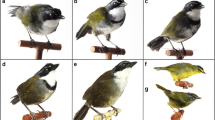Summary
Nonmigratory populations of Whitecrowned Sparrows in coastal California exhibit dialects in territorial male songs that are stable in space and time. By field playback experiments, we tested a prediction from the hypothesis that male aggressive interactions prohibit mixing of song dialects. Playback of the home dialect ‘Clear’ song to territorial males singing the ‘Clear’ dialect resulted in less response than that given to playback of the neighboring ‘Buzzy’ dialect. Response to both ‘Buzzy’ and ‘Clear’ dialect songs by target ‘Clear’ males, however, was greater than that given to the ‘Bodega’ dialect recorded 55 km away (Figs. 2 and 3). We conclude that these results are consistent with the hypothesis that male-male aggressive interactions play an important role in reducing dialect mixing.
Similar content being viewed by others
References
Baker MC (1975) Song dialects and genetic differences in Whitecrowned Sparrows (Zonotrichia leucophrys). Evolution 29:226–241
Baker MC, Mewaldt LR (1978) Song dialects as barriers to dispersal in White-crowned Sparrows, Zonotrichia leucophrys nuttalli. Evolution 32:712–722
Brooks RJ, Falls JB (1975) Individual recognition by song in white-throated sparrows. I. Discrimination by songs of neighbors and strangers. Can J Zool 43:879–888
Dittus WPJ, Lemon RE (1969) Effects of song tutoring and acoustic isolation on the song repertoires of cardinals. Anim Behav 17:523–533
Kroodsma DE (1976) The effects of large song repertoires on neighbor “recognition” in male song sparrows. Condor 78:97–99
Kroodsma DE (1978) Aspects of learning in the ontogeny of bird song: Where, from whom, when, how many, which and how accurately? In: Burghardt G, Bekoff M (eds) Ontogeny of behavior. Garland Publishing, New York
Lemon RE (1975) How birds develop song dialects. Condor 77:385–406
Marler P, Tamura M (1962) Song “dialects” in three populations of White-crowned Sparrows. Condor 64:368–377
Marler P, Tamura M (1964) Culturally transmitted patterns of vocal behavior in sparrows. Science 146:1483–1486
Milligan MM, Verner J (1971) Inter-population song dialect discrimination in the White-crowned Sparrow. Condor 73:208–213
Mulligan JA (1966) Singing behavior and its development in the song sparrow Melospiza melodia. Univ Calif Publ Zool 81:1–76
Munz PA, Keck DD (1959) A California flora. Univ Calif Press, Berkeley
Nottebohm F (1969) The song of the Chingolo, Zonotrichia capensis, in Argentina: Description and evaluation of a system of dialects. Condor 71:299–315
Thielcke G (1969) Geographic variation in bird vocalizations. In: Hinde RA (ed) Bird vocalizations. Cambridge Univ Press, Cambridge, pp 311–339
Verner J, Milligan MM (1971) Responses of male White-crowned Sparrows to playback of recorded songs. Condor 73:56–64
Wunderle JM, Jr (1978) Differential response of territorial Yellowthroats to the songs of neighbors and non-neighbors. Auk 95:389–395
Author information
Authors and Affiliations
Rights and permissions
About this article
Cite this article
Baker, M.C., Thompson, D.B., Sherman, G.L. et al. The role of male vs male interactions in maintaining population dialect structure. Behav Ecol Sociobiol 8, 65–69 (1981). https://doi.org/10.1007/BF00302845
Received:
Accepted:
Issue Date:
DOI: https://doi.org/10.1007/BF00302845




